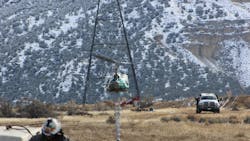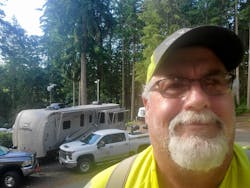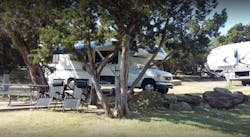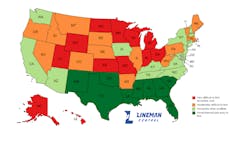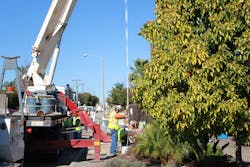Kelly Steber has spent nearly two-thirds of his career on the road since he first entered the line trade in 1987. As the superintendent of substation operations for PAR Western Line Construction, he has traveled nationwide to respond to storms and supervise projects. “I have always owned two homes — one that my family lives in and I visit, and my second home with taillights,” says Steber, who has been married for 30 years to his wife and has a 27-year-old daughter.
Traveling linemen have enormous and endless opportunities, Steber says. “If you are willing to travel, you can get almost every experience in the line trade, and I think it makes you a lot better at what you do,” he says. “By working with linemen with different work ethics and skill levels, it creates wisdom and a well-rounded experience that is very valuable.”
As Steber travels across the country, he has enjoyed the camaraderie of the line trade. “It’s amazing when you travel —you could go the farthest in this country, and almost 100% of the time, you run into somebody you know who you haven’t seen for a long time,” says Steber, who grew up in Montana and now lives in the Pacific Northwest. “Those friendships are coast to coast nationwide, and it brings to you a real strong sense of pride in what we do and almost a feeling of eliteness.”
Rae-Lynn Hawco, a journeyman linewoman for Valard Construction, says to be a traveling lineworker, it takes a well-rounded individual who is adaptable to change. “Line work is the best adventure,” she says.
Reaping the Rewards
Noah Stoll, a lineman who began his career at Xcel Energy and now contracts for Tiger Powerline, says how long the lineworkers stay in one place depends on the job duration — ranging from a long weekend to one to two months in many situations. Historically, the most common travel work is storm response following a tropical storm or hurricane. Recently, however, he has seen lineworkers hit the road for major projects.
“With the recent push into grid modernization and some big transmission projects moving forward, it isn’t uncommon for some linemen to travel across state lines to work on a new interstate power grid upgrade,” says Stoll, who works at Lineman Central.
For those lineworkers who travel, they can often be found in two buckets — those who do one or two storm recovery jobs a year and a group that spends six to seven months of the year on the road. Linemen who travel occasionally for storm work may stay at a hotel, but those who are traveling constantly may invest in a “tricked out” camper. “An investment in a nice camper can pay off nicely as you will still collect the per diem that an employer offers as part of the travel pay contract. Some linemen have some pretty amazing camper setups.”
He says a traveling lifestyle can be grueling, and the biggest opportunity for traveling lineworkers is the increase in pay. “The occasional lineworker will tell you he or she enjoys life on the road, seeing new parts of the country and the people they will meet at the campsite, but let’s be honest — the biggest perk is the pay — that’s what we give up sleeping in our own bed for,” he says. “We have seen lineworkers in 2021 make consistently over $250,000 a year with some of the crazy storm recovery work that is needed in the southeast.”
For older lineworkers with families, this might not be possible or desirable, but for younger journeymen, this is often the peak earnings of their career, he says. “It can be incredibly tough to travel with school age kids. In the summer, it can be a nice change of pace and doable for the family, but this doesn’t always line up with storm needs.”
When linemen are able to travel for storm response, however, they can often enjoy the bond of the trade. For example, Stoll says his fellow team member, Jay Richman, loves to share a storm response story from Ohio. “At a campground in Florida following Hurricane Rita, someone started playing the Ohio State fight song on their speaker by the campfire,” he says. “Within three minutes, six different linemen from Ohio came out of various campers and started singing together. Line life is a brotherhood.”
To stay safe on the road, Stoll advises linemen to try to get on with a traveling crew. He says as is the case with most safety protocols in power distribution, a lineman is only as safe as the weakest link on the crew. “Storm recovery work is long days and sleepless nights. With a crew often thrown together last minute with people you don’t know as well this can get dangerous.”
Focusing on Safety
When working on the road, it’s important to remember that safety does not only pertain to the job site. For example, Steber says a lot of workers may feel like they are forced to be in a hurry, but safety comes first. Unfortunately, certain places and different work groups have a cowboy approach to line work, he says. “That’s improved since my early days in the trade, and the world’s changed and the way we view the work is changing dramatically,” he says. “In general, it’s become a much safer work environment through the culture and understanding.”
When working on different systems, he says it’s important to speak up if you see an unsafe situation, but otherwise it’s important to respect the local utility. “We need to respect the way they want to do it, and if it’s not safe, then we definitely need
to address it,” he says.
Also, he advised others to stay in safe areas and keep their eyes open. “If you’re new to an area and to a group of people, you have to spend time evaluating the conditions and the mentality of the folks,” he says. “If it doesn’t feel like a safe environment, then you may have to reconsider your choice to be there and move on and go somewhere different.”
Traveling for Storm Work
Throughout his career, Steber has responded to Midwest ice storms, Superstorm Sandy and several fire storms, which he describes as a nasty and tough experience. “You look like a coal miner at the end of the day because of all the dust and ash being kicked up with the helicopters,” he says. “That can be some of the toughest work.”
During these storms, he says it’s essential to be prepared and bring enough food and water to last about two weeks. “I bring crackers, tuna fish, energy bars, granola bars, Jerky, Gatorade, protein shakes and water. You try to plan it so you can get the most bang for your buck.”
With hotel rooms often in short supply, linemen also need to bring a bedroll because unlike construction jobs, they can’t travel in their RV. “I’ve had to sleep a lot of nights in our company pickup or our line truck. You just find a place to sleep and do what you can for a bed.”
Host utilities often set up man camps for mutual aid crews, but services are not available immediately for support crews. “If you are some of the first feet on the ground in that area, you have to take care of yourself,” he says. “You will go into areas that are devastated, and it takes time to get lodging set up. I’ve been in areas where there
are no restaurants, and not even convenience storms are open because of the damage done by the storm.”
On storm duty, he brings enough clothes to last him as long as possible. “Sometimes you don’t know how long you are going to be there, and you try to bring enough clothes to make it through a work week, and hopefully, laundry will get set up in time,” he says. “It ain’t uncommon for linemen to wear the same clothes longer than they intend to.”
Living the RV Lifestyle
Now that he’s working in the Pacific Northwest, Steber’s family can come visit him for a long weekend. When they first moved out to the area and were in between homes, his wife spent three months with him in the RV. “We both loved it,” he says. “In our spare time, we explored and learned about the area and there were a lot of fascinating things to discover.”
When he’s not working a storm and not at home, he’s living in his 40-ft RV near a construction site. He can prepare his own meals using his residential-sized kitchen equipped with a full-sized refrigerator and stove. He also built an outdoor kitchen with a pellet-type smoker and an outdoor griddle.
“When I cook, I try to cook in a manner where leftovers are useful too — whether it be for lunch the next day or for meals for the next three or four days,” he says. “At this stage and point, I try to make it to where I’m quite comfortable living on the road.”
On most transmission and distribution jobs he has a mobile office set up on the job site, which features lay down areas and a show up location. He is scheduled to be on his current job assignment in Tacoma, Washington, until the end of September, and then he will move to Olympia, Washington, to start a new project. Meanwhile, his family is living in Oregon, and he often sees them about every other weekend. He calls his wife for an hour every night when he leaves the job site, and he calls his daughter once a week.
“I know this type of work is not for everybody and it’s definitely difficult,” he says. “I mean, especially when you talk about relationships, I was lucky. I married a very understanding, very positive, woman who supports me 110%. You must be extremely flexible on both sides to make it work and have a lot of communication.”
On the Road Again
Like Steber, Bryan Wilson, a journeyman lineman for PAR Electric, has also traveled for line work with his camper. Wilson, who served in the military, says working in the line trade is the same — you are away from home all the time.
“Your jobs could be four months to a year, especially if you live in a small town,” he says. “Like up here in Oregon, there’s not much work in your backyard, so you’re always on the road five or six hours away.”
He has been married to his wife, who he says has the “hardest job of all as a stay-at-home mom of three sons,” for 22 years. “She is at home, running the house and doing everything like taking our kids to soccer and baseball,” he says. “It’s just like when I was deployed in the military, when I came home, it was like, ‘Oh man, stuff’s still running without you.’ Then you’re stepping in to do a little bit, and then go back to work.”
Linemen who work for a utility can often stay at home, but those who work for a contractor are on the road, and it’s part of the job, he says. When he first started out in the trade, and he was in the apprenticeship, he and his wife lived in California north of San Francisco in a travel trailer. “When my son was born, we took the table out of the trailer and put his crib there,” he says. “That was his little cubby hole. For two years of his life, it worked.”
Having a house at that time was impossible due to the constant traveling, so his family moved around with him. When he topped out as a journeyman, he worked for Sturgeon Electric and Hawkeye. Then when his second son was born, they moved to the Pacific Northwest, where they have lived ever since. After working as a lineman and foreman, he is now a safety manager. “I’m now home more often than not,” he says. “Some weeks, I’m gone during the week, but I’m home during the weekends.”
While traveling in the trade has its share of challenges, he says it can pay off financially. For example, he earned $250,000 last year. “If you travel and work all the time, then you could be making a lot of money with great benefits.”
Hot Spots for Traveling Opportunities in the Trade
LinemanCentral.com has an active membership of 8,000 lineworkers who connect for new jobs, travel positions and work opportunities. The Web site also partners with more than 180 training programs nationwide to provide up-to-date information about apprenticeships, climbing schools and certificate programs, says Lineman Noah Stoll from LinemanCentral.com. He shared this color-coded map of the hot spots for traveling line work.
About the Author
Amy Fischbach
Electric Utilities Operations
Amy Fischbach is the Field Editor for T&D World magazine and manages the Electric Utility Operations section. She is the host of the Line Life Podcast, which celebrates the grit, courage and inspirational teamwork of the line trade. She also works on the annual Lineworker Supplement and the Vegetation Management Supplement as well as the Lineman Life and Lineman's Rodeo News enewsletters. Amy also covers events such as the Trees & Utilities conference and the International Lineman's Rodeo. She is the past president of the ASBPE Educational Foundation and ASBPE and earned her bachelor's and master's degrees in journalism from Kansas State University. She can be reached at [email protected].
